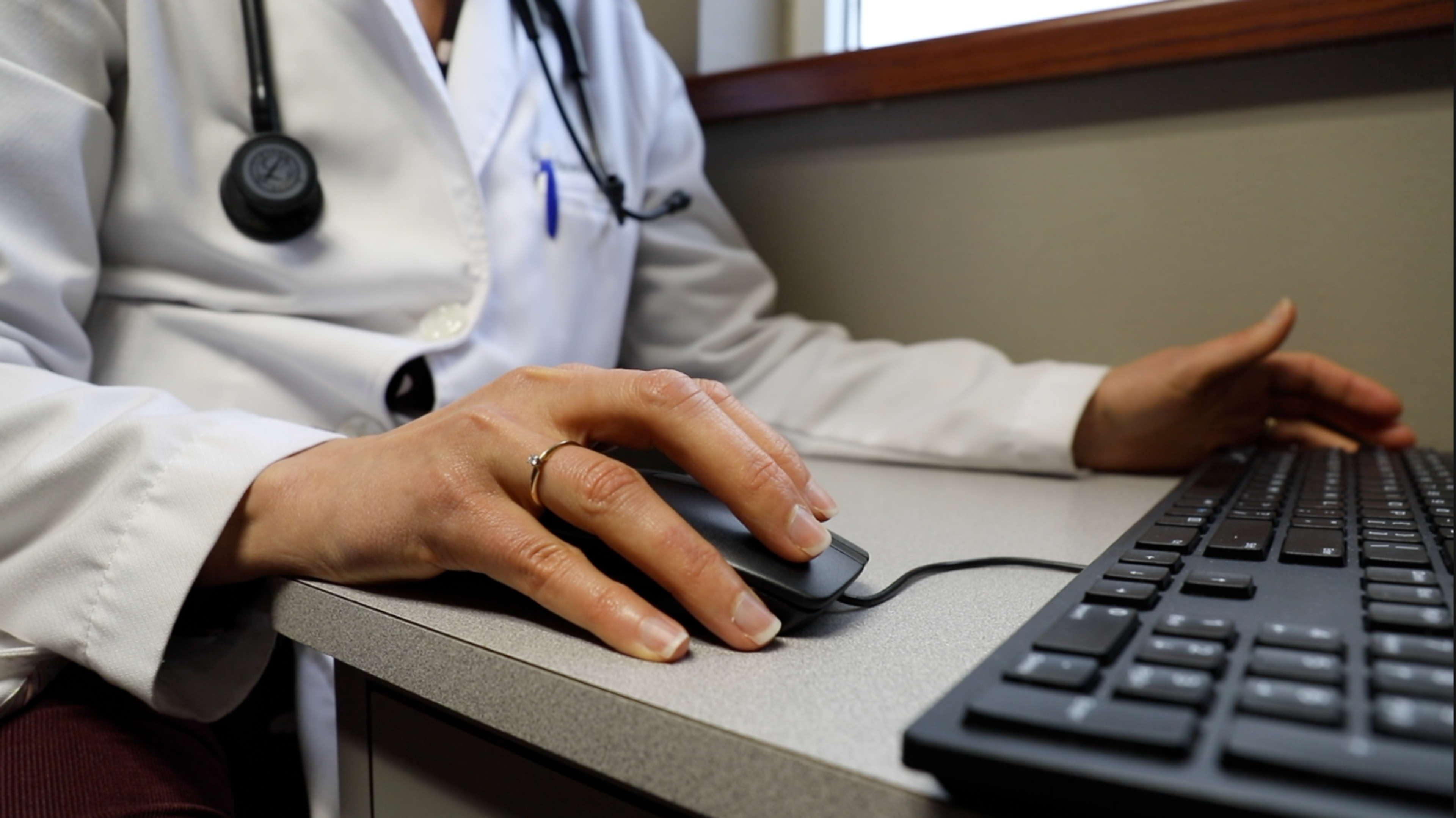UP Primary Care Doctors Delivering Local Expertise, National Quality

Blue Daily
| 7 min read

Doctors at South Shore Family Practice in Marquette had a problem: many of their patients work in the logging industry, and grueling work schedules meant loggers couldn’t make their appointments during regular daytime hours.
“That’s their culture,” said Deb England, practice manager and longtime UP resident, of the loggers. “If you think you’re going to change them, to have them come in for a visit? No. But if you want to be successful, you want to work around what they do.”
Care teams at the practice put the patient’s needs first, finding ways to connect with the loggers on their health: they gave them equipment so the patients could test their blood sugar and blood pressure at home, and offered telehealth appointments.
That local knowledge – coupled with the patient-centered approach – is one of the ways many primary care doctors in Michigan’s Upper Peninsula have built high-quality practices that improve the health of their communities.
These practices have been recognized for their efforts with the Patient-Centered Medical Home (PCMH) designation from Blue Cross Blue Shield of Michigan, and a national Total Care designation from the Blue Cross Blue Shield Association. These designations recognize practices that are doing their best to offer patients a V.I.P. experience – for going above and beyond to meet stringent measures for high-quality care at affordable costs.
The Total Care designations help give peace of mind to everyone at all ends of the system – patients, doctors, hospitals and insurance carriers – that the care delivered at primary care offices in Michigan’s Upper Peninsula is on par with practices in major metropolitan areas across the state and the country, said Tom Leyden, director of Value Partnerships at Blue Cross Blue Shield of Michigan.
“If you’re seeing a Total Care provider, the care is the same that you would receive in Detroit, Grand Rapids or anywhere in the Upper Peninsula,” Leyden said.
Local care, local trust
In Michigan’s U.P., health care challenges are a frequent narrative – the rural area, coupled with long, snowy winters can pose a barrier to seeing a doctor. But if you ask any primary care doctor committed to the U.P. – like Dr. Beth Schroeder of Michigan Wisconsin Family Practice Associates in Iron Mountain –local health care has benefits to the patient and their long-term health.
“If you can stay in your community and receive all your care there, it’s more comfortable. You’re familiar with people. You maybe know them, or you know someone who has seen them,” Schroeder said. “It’s convenient care, you’re here, you don’t have to travel. It’s easier that way.”
Schroeder has practiced medicine in the U.P. for 20 years – and said the depth of services available, even in a small community like Iron Mountain, is part of what drew her to join a practice there.
“We know the challenges of local residents and how to meet those challenges and take care of them in a way that’s more specific to them and more individualized,” Schroeder said.
That sense of community is an important part of taking care of patients in a primary care setting.
At South Shore Family Practice in downtown Marquette, staff know patients’ faces and names when they walk in the door, England said – which builds connection.
“I think we’ve heard many times where the patient has come back and said they just feel like family. The patients can’t wait to tell any staff member that they stopped smoking – or that their blood pressure has come down,” England said. “And to me, that’s the trust: they do see us as family because they can’t wait to share that.”
Taking care of the whole person
Building trust with patients is important in health care: health is not only determined by a person’s weight or blood test results. It’s closely tied to their emotional health and mental well-being – as well as social and environmental factors outside their control. It’s common, especially in rural areas of the U.P., for individuals to hide these parts of their lives from outsiders.
“Knowing our friends and neighbors also helps us know them better as patients. Sometimes patients may be reluctant to say what’s going on in their lives outside,” said Ann Gephart, manager at Single Track Health in Marquette. “Sometimes I think patients can get misunderstood or not understood well enough because the facility just doesn’t know who they are.”
PCMH and Total Care practices screen patients for conditions like depression and anxiety – as well as for social needs.
“Can you afford your heating in the winter – do you have electricity? Do you have transportation? All of those things factor into a patient’s care – not only their and their hypertension and their heart failure – but all of these things can affect how those medical goals that we have for patients are met,” Schroeder said.
Not only do local doctors and care teams at PCMH/Total Care practices in the U.P. have the connection and trust with their patients to ask the right questions, but they also know the resources in the community that can help them with their needs – whether it’s assistance paying bills or getting a ride home.
“Local care is always the first and best place to start – it’s your friends and neighbors and community caring for you,” Gephart said. “They can take all of the factors in your life into account before making a referral for you to wherever you need to go.”
24/7 care
At primary care practices recognized with PCMH/Total Care designations, patients have access to a doctor for any need, any time.
“The commitment is 24/7,” Schroeder said of how doctors like herself approach the job. “There is always someone available to our patients at all times.”
Same-day visits are always built into the schedule at Schroeder’s practice to help patients with more urgent needs. And after hours, there’s an on-call doctor to help with any question, like if a child has a fever and they want to know if they should go to the emergency room or wait until the morning.
In the U.P., this service is especially vital – as rural communities and winter weather can easily make a trip into town more of a challenge. But advancements in technology by many primary care offices in the U.P. have helped to bridge this gap. Many offer telehealth visits, and have updated electronic medical record systems that allow providers to track patients’ health if they are referred to a specialist, or if they travel during the winter months as snowbirds.
National quality
Primary care offices in the U.P. are being recognized for their efforts to transform the way that they provide health care – documenting outcomes for patients, following up with test results and care, using established care pathways, screening for whole person health, providing 24/7 access to doctors and updating their technology to participate in electronic medical records.
These are among the factors that go into a practice receiving a PCMH/Total Care designation. n the U.P., there are 40 primary care practices with this designation.
“Upper Peninsula providers have done a phenomenal job transforming the primary care delivery system,” Leyden said. “Total Care designations are the seal of approval that really help people feel confident they are seeing providers who are going to provide the highest quality care possible.”
PCMH and Total Care practices are not only changing their systems to be more patient-centered, but they are also improving the quality of health care they’re delivering, Leyden said. Patients who see a doctor in a PCMH practice are more likely to improve their diabetes and to make use of pediatric well-child visits. They’re also more likely to seek care at the right place, at the right time – which means avoiding a costly ER visit for a non-emergency. And most importantly, the result is a safer, healthier community.
“What we’ve seen over the last-decade-plus is PCMH providers are doing a better job managing the care of the patients and that’s reducing the continued progression of disease. People who go to a PCMH provider, their diseases are not progressing at the same rate as you might expect – so people are staying healthier,” Leyden said. “And that’s ultimately the goal of a health plan, and what we’re trying to do through our PCMH program: keep people healthy, keep them out of the ER, and keep their conditions in check.”





